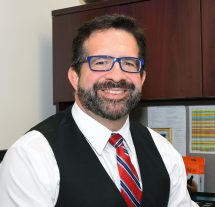IDEAS
SEL starts at the top
By Melanie Stefanovic, Daniel Reyes-Guerra and Dana Zorovich-Godek
Categories: Leadership, School leadership, Social & emotional learningFebruary 2021
Read the remaining content with membership access. Join or log in below to continue.
Sed ut perspiciatis unde omnis iste natus error sit voluptatem accusantium doloremque laudantium, totam rem aperiam, eaque ipsa quae ab illo inventore veritatis et quasi architecto beatae vitae dicta sunt explicabo. Nemo enim ipsam voluptatem quia voluptas sit aspernatur aut odit aut fugit, sed quia consequuntur magni dolores eos qui ratione voluptatem sequi nesciunt. Neque porro quisquam est, qui dolorem ipsum quia dolor sit amet, consectetur, adipisci velit, sed quia non numquam eius modi tempora incidunt ut labore et dolore magnam aliquam quaerat voluptatem.
References
CASEL [Collaborative for Academic, Social, and Emotional Learning]. (2020). What is SEL? casel.org/what-is-sel/
Clifford, M., Behrstock-Sherratt, E., & Fetters, J. (2012). The ripple effect: A synthesis of research on principal influence to inform performance evaluation design. A Quality School Leadership Issue Brief. American Institutes for Research.
Day, C., Gu Q., & Sammons, P. (2016). The impact of leadership on student outcomes: How successful school leaders use transformational and instructional strategies to make a difference. Educational Administration Quarterly, 52(2), 221-258.
Durlak, J.A., Weissberg, R.P., Dymnicki, A.B., Taylor, R.D., & Schellinger, K.B. (2011). The impact of enhancing students’ social and emotional learning: A meta‐analysis of school‐based universal interventions. Child Development, 82(1), 405-432.
Dusenbury, L., Yoder, N., Godek, D., & Atwell, M. (2020). Cultivating the SEL skills employers demand. CASEL.
Hallinger, P. (2010). Developing instructional leadership. In Developing successful leadership (pp. 61-76). Springer, Dordrecht.
Hallinger, P. & Heck, R.H. (1996). Reassessing the principal’s role in school effectiveness: A review of empirical research, 1980-1995. Educational Administration Quarterly, 32(1), 5-44.
Hargreaves, A. (1998). The emotional practice of teaching. Teaching and Teacher Education, 14(8), 835-854.
Jagers, R.J., Rivas-Drake, D., & Williams, B. (2019). Transformative social and emotional learning (SEL): Toward SEL in service of educational equity and excellence. Educational Psychologist, 54(3), 162-184.
Jones, S.M., Bouffard, S.M., & Weissbourd, R. (2013). Educators’ social and emotional skills vital to learning. Phi Delta Kappan, 94(8), 62-65.
Leithwood, K., Louis, K.S., Anderson, S.E., & Wahlstrom, K.L. (2004). Review of research: How leadership influences student learning. The Wallace Foundation.
Leithwood, K., Day, C., Sammons, P., Harris, A., & Hopkins, D. (2006). Seven strong claims about successful school leadership. National College for School Leadership.
Louis, K.S., Leithwood, K., Wahlstrom, K.L., & Anderson, S.E. (2010). Investigating the links to improved student learning: Final report of research findings. The Wallace Foundation.
Schonert-Reichl, K.A. (2017). Social and emotional learning and teachers. The Future of Children, 27(1), 137-155.
Shields, C.M. (2010). Transformative leadership: Working toward equity in diverse contexts. Education Administration Quarterly, 46(4), 558-589.
Stringer, K. (2019, July 9). SEL in the house: Democrats approve millions in landmark federal funding for social-emotional learning in bill that now faces test in Senate. www.the74million.org/sel-in-the-house-democrats-approve-millions-in-landmark-federal-funding-for-social-emotional-learning-in-bill-that-now-faces-test-in-senate/
Taylor, R.D., Oberle, E., Durlak, J.A., & Weissberg, R.P. (2017). Promoting positive youth development through school‐based social and emotional learning interventions: A meta‐analysis of follow‐up effects. Child Development, 88(4), 1156-1171.
Weissberg, R.P., Durlak, J.A., Domitrovich, C.E., & Gullotta, T.P. (2015). Social and emotional learning: Past, present, and future. In J.A. Durlak, C.E. Domitrovitch, R.P. Weissberg, & T.P. Gullotta (Eds.), Handbook of social and emotional learning (pp. 3-19). Guilford Press.
Zimmerman, M. A. (2000). Empowerment theory. In Handbook of community psychology (pp. 43-63). Springer.
Categories: Leadership, School leadership, Social & emotional learning
Recent Issues
NAVIGATING NEW ROLES
April 2025
Whether you’re new to your role or supporting others who are new,...
LEARNING DESIGNS
February 2025
How we learn influences what we learn. This issue shares essential...
BUILDING BRIDGES
December 2024
Students benefit when educators bridge the continuum of professional...
CURRICULUM-BASED PROFESSIONAL LEARNING
October 2024
High-quality curriculum requires skilled educators to put it into...













